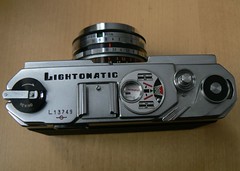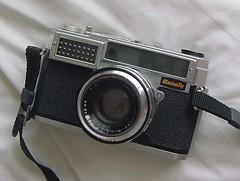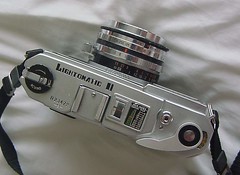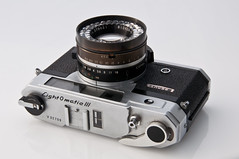Difference between revisions of "Beauty Lightomatic"
m (Lots of repetition. Re-structured to better show the similarities and differences between models (coming back to check and tidy).) |
m |
||
| Line 1: | Line 1: | ||
| − | + | {{NeedPhotos}} | |
== Overview == | == Overview == | ||
| Line 6: | Line 6: | ||
Each model shares some common features. | Each model shares some common features. | ||
| − | * Viewfinder: Integrated coincidence rangefinder/ viewfinder with self-correcting bright line. | + | * Viewfinder: Integrated coincidence rangefinder/viewfinder with self-correcting bright line. |
* Focus: Coupled rangefinder with manual ring on lens barrel. | * Focus: Coupled rangefinder with manual ring on lens barrel. | ||
| + | * Meter: [[Selenium meter]] electro-mechanically coupled to lens barrel aperture, shutter speed settings, and film speed index. | ||
| + | * Exposure: Centre-the-needle system with pointer window on the top plate of the camera. | ||
* Lens: 45mm f1.9 (6 elements in unknown number of groups) stopping down to f16. | * Lens: 45mm f1.9 (6 elements in unknown number of groups) stopping down to f16. | ||
* Close Focus: 0.8m / 2'7". | * Close Focus: 0.8m / 2'7". | ||
* Shutter:. Five blade [[Copal|Copal-SV]] shutter with speeds: B, 1, 2, 4, 8, 15, 30, 60, 125, 250 & 500 sec,. plus B. Shutter speeds and aperture settings can be interlocked. The shutter release locks when the advance lever is flush with the camera body. | * Shutter:. Five blade [[Copal|Copal-SV]] shutter with speeds: B, 1, 2, 4, 8, 15, 30, 60, 125, 250 & 500 sec,. plus B. Shutter speeds and aperture settings can be interlocked. The shutter release locks when the advance lever is flush with the camera body. | ||
* Cable Release: Standard socket in shutter release button. | * Cable Release: Standard socket in shutter release button. | ||
| − | |||
| − | |||
* Filter Size: 55mm screw in. | * Filter Size: 55mm screw in. | ||
* Flash: Cold shoe and PC terminal. M and X sync. | * Flash: Cold shoe and PC terminal. M and X sync. | ||
| Line 33: | Line 33: | ||
* The Lightomatic was introduced in 1959. | * The Lightomatic was introduced in 1959. | ||
| + | * The Lightomatic was sold as the LM is some markets. | ||
* The lens is either a Beauty-S or Canter-S. | * The lens is either a Beauty-S or Canter-S. | ||
* The Selenium meter cell window is located on the front of the camera body. | * The Selenium meter cell window is located on the front of the camera body. | ||
| Line 86: | Line 87: | ||
|image_rights= with permission | |image_rights= with permission | ||
}} | }} | ||
| − | * The Beauty Lightomatic III was introduced in 1961 | + | * The Beauty Lightomatic III was introduced in 1961. |
| + | * It was sold using the alternative names of Lightmatic III and Lite III, which appears to be the USA version. | ||
* The lens is a Biokor-S. | * The lens is a Biokor-S. | ||
* The Selenium meter cell was relocated to surround the lens. | * The Selenium meter cell was relocated to surround the lens. | ||
| Line 92: | Line 94: | ||
* The meter needle pointer was made visible in the viewfinder. | * The meter needle pointer was made visible in the viewfinder. | ||
* The meter film speed range changed slightly to 10 to 1600 ASA. | * The meter film speed range changed slightly to 10 to 1600 ASA. | ||
| + | * In the UK, the camera was an exclusive [[Dixons]] import. | ||
| Line 97: | Line 100: | ||
<!--Images required here--> | <!--Images required here--> | ||
| − | * The Beauty Lightmatic SP was introduced in 1963 (note the "o" has been dropped from the name), and is a slightly updated/revised version of the Light'''O'''matic III. The differences between the | + | * The Beauty Lightmatic SP was introduced in 1963 (note the "o" has been dropped from the name), and is a slightly updated/revised version of the Light'''O'''matic III. |
| + | * The differences between this camera and the Lightomatic III are mainly cosmetic, and negligible (e.g. the frame counter has moved from 3 o'clock to 12 o'clock, relative to the wind crank). | ||
| + | * The only new feature was a film movement confirmation indicator, which is only revealed when the wind crank arm is operated (in other words, it's under the wind crank arm's rest position). | ||
Revision as of 08:28, 6 August 2016
This article needs photographs. You can help Camera-wiki.org by adding some. See adding images for help.
Contents
Overview
The Beauty Lightomatics are a series of 35mm rangefinder cameras made by the Beauty Camera Company between 1959 and 1963.
Each model shares some common features.
- Viewfinder: Integrated coincidence rangefinder/viewfinder with self-correcting bright line.
- Focus: Coupled rangefinder with manual ring on lens barrel.
- Meter: Selenium meter electro-mechanically coupled to lens barrel aperture, shutter speed settings, and film speed index.
- Exposure: Centre-the-needle system with pointer window on the top plate of the camera.
- Lens: 45mm f1.9 (6 elements in unknown number of groups) stopping down to f16.
- Close Focus: 0.8m / 2'7".
- Shutter:. Five blade Copal-SV shutter with speeds: B, 1, 2, 4, 8, 15, 30, 60, 125, 250 & 500 sec,. plus B. Shutter speeds and aperture settings can be interlocked. The shutter release locks when the advance lever is flush with the camera body.
- Cable Release: Standard socket in shutter release button.
- Filter Size: 55mm screw in.
- Flash: Cold shoe and PC terminal. M and X sync.
- Film Advance Single stroke lever.
- Frame Counter: Counts up. Resets automatically when camera back is opened.
- Rewind: Collapsible crank, and rewind selector switch.
The Beauty Lightomatic or LM

|
| Lightomatic top view image by Donnatella G (Image rights) |
- The Lightomatic was introduced in 1959.
- The Lightomatic was sold as the LM is some markets.
- The lens is either a Beauty-S or Canter-S.
- The Selenium meter cell window is located on the front of the camera body.
- The meter film speed range is from 6 to 1600 ASA.
- A graphic next to the meter needle pointer window on the top pate illustrates the direction in which the aperture/shutter speed dials should be moved in order to center the needle.
- To the right of the needle pointer window there is a film type reminder with two settings.
A Beauty LM2 is also reported.)[1]
The Beauty Lightomatic II

|
| Front view image by Goodimages (Image rights) |

|
| c.1960 Lightomatic II image by Goodimages (Image rights) |
- The Beauty Lightomatic II was introduced in 1960.
- The lens is a Biokor-S.
- The meter needle pointer window was re-designed so that it's shape changed from circular to rectangular, and the exposure adjustment graphic was abandoned along with the film type reminder. This was replaced by a table showing film speed setting parameters (e.g. a setting of 100 ASA accommodated films between 75 - 120 ASA.
- The viewfinder and rangefinder windows where unified by a singe glass covering.
The Beauty Lightomatic III (Lightmatic/Lite III)

|
| Top engraving "Beauty Light O matic III" image by Hans Jan Dürr (Image rights) |

|
| Lightomatic III with meter cells around lens image by David Broglin (Image rights) |
- The Beauty Lightomatic III was introduced in 1961.
- It was sold using the alternative names of Lightmatic III and Lite III, which appears to be the USA version.
- The lens is a Biokor-S.
- The Selenium meter cell was relocated to surround the lens.
- The top plate meter needle pointer no longer supported information graphics
- The meter needle pointer was made visible in the viewfinder.
- The meter film speed range changed slightly to 10 to 1600 ASA.
- In the UK, the camera was an exclusive Dixons import.
The Beauty Lightmatic SP
- The Beauty Lightmatic SP was introduced in 1963 (note the "o" has been dropped from the name), and is a slightly updated/revised version of the LightOmatic III.
- The differences between this camera and the Lightomatic III are mainly cosmetic, and negligible (e.g. the frame counter has moved from 3 o'clock to 12 o'clock, relative to the wind crank).
- The only new feature was a film movement confirmation indicator, which is only revealed when the wind crank arm is operated (in other words, it's under the wind crank arm's rest position).
Notes
- ↑ Kokusan kamera no rekishi, p.397.
Links
In English:
- Beauty Lightomatic in Mediajoy's Guide to Classic Cameras (follow the "Next" links at the bottom of the page to have illustrated instructions of use)
- Three Lightomatic versions compared to the Beaumat by paulfromukcamera on Flickr
- Beauty Lightomatic page at My 35mm Film camera Collection
- Beauty Lightomatic III page at My 35mm Film camera Collection
- Beauty Lightmatic SP page at My 35mm Film camera Collection
In Japanese:
In French: